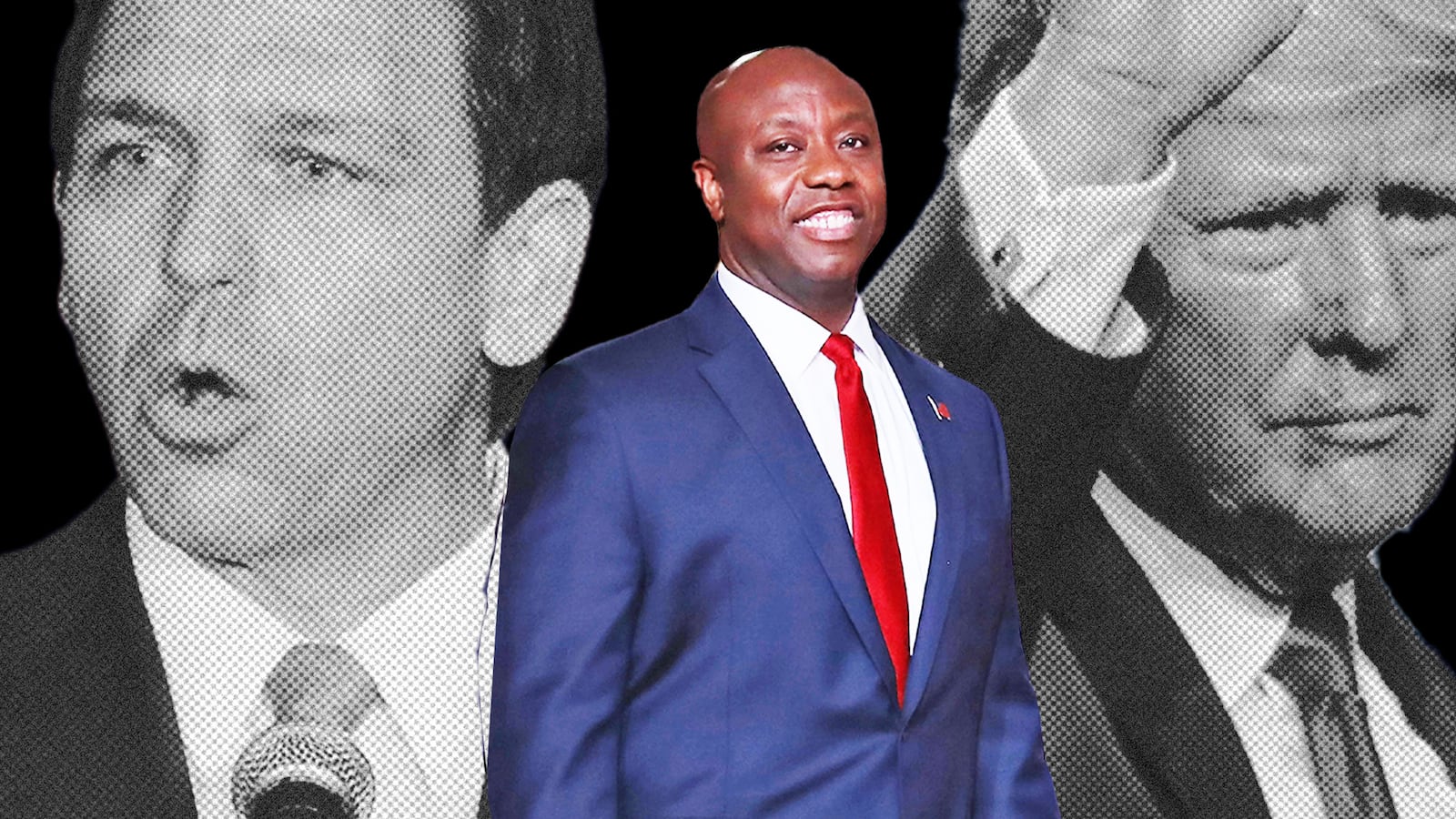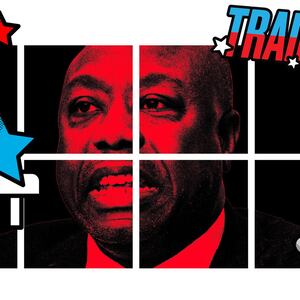Last week, Sen. Tim Scott announced the creation of an exploratory committee to run for president in 2024. Scott, an African-American Republican from South Carolina, grew up in a poor community as the son of a single mom.
In my view, Republicans could do a lot worse than President Scott. But despite his inspirational backstory, authentic likability, and message of hope, the general consensus is that he has an ice cube's chance in hell of winning the Republican nomination. So why is he even pursuing this?
In a normal world (this is not a normal world), there are numerous reasons for an aspiring politician like Scott to throw his hat in the ring. The frontrunner might stumble or have to drop out of the race, for example. Getting in the race gives you a shot at being at the right place at the right time.
Sometimes frontrunners destroy each other and leave room for a breakout candidate to run up the middle. It’s theoretically possible that Trump and DeSantis could go nuclear on each other to the degree that the electorate yearns for some counterprogramming. Scott’s amiable and positive persona would stand in stark contrast to the personalities of both Trump and DeSantis.
Republicans also have a history of nominating the next guy in line. Ronald Reagan ran in 1976, before winning in 1980. More recently, John McCain was runner-up to George W. Bush in 2000, and Mitt Romney was runner-up to McCain in 2008. Both men would become their party’s nominee four years later.
It’s also true that running for president generally increases your odds of being tapped for the vice presidency—a job that Scott might covet.
George H.W. Bush was a Reagan adversary before becoming his running mate. Joe Biden ran (an albeit longshot campaign) before being tapped as Barack Obama’s veep. And Kamala Harris attacked Joe Biden’s record on bussing before joining his ticket.
And even if you don’t get picked for veep, running for president can also elevate your profile in other ways.
Take Mike Huckabee, for example. He didn’t win, but his performance in Republican debates elevated his status as a Fox News celeb. Likewise, Pete Buttigieg became a national figure (going from mayor of South Bend, Indiana, to Transportation Secretary) by virtue of his 2020 Democratic primary campaign.
This is to say that, in a normal environment, Scott’s decision would be perfectly rational.
But this environment is far from normal. This is Donald Trump we’re talking about. He doesn’t take kindly to opposition. You’d be hard-pressed to find any of his 2016 opponents who had their stature “elevated” by virtue of running for president.
In 2016, Trump compared Dr. Ben Carson’s “pathological temper” to child molesting (in fairness, he later made Carson head of the U.S. Department of Housing and Urban Development). More recently, Trump suggested Ron DeSantis could face allegations from “underage” girls, or “possibly a man!” As I write this, Trump’s SuperPAC has unveiled an ad mocking Ron DeSantis for eating pudding with three fingers.
It probably goes without saying that, while a normal politician might defeat you, Trump humiliates you. (None of his 2016 competitors are daring to run in 2024.)
Scott has been able to maintain his Republican street cred (more so than most Republicans), while not completely beclowning himself. This is no small feat. What are the odds he can continue threading this needle while running for president?
If Scott thinks he can tiptoe through the raindrops and avoid Trump’s wrath indefinitely, running for president guarantees he’ll be asked questions with no good answer: “Who won the 2020 election?” and “Do you think Jan. 6 rioters were ‘insurrectionists’?” The honest answer is not the popular answer (and will assuredly draw Trump’s ire).
Another challenge for Scott will be whether he has the policy chops and dexterity to elevate himself (as Huckabee, Buttigieg, and others have) when faced with the scrutiny inherent in running for president.
Like Huckabee and Buttigieg, Scott is a likable and charismatic orator. However, he recently stumbled badly when he could not coherently answer whether he supported a 15-week abortion ban.
Scott briefly landed on a 20-week ban, which was counterintuitive for a guy whose candidacy presumably rests on strong showings in socially conservative states like Iowa and South Carolina.
Perhaps that is why he later amended his answer, telling NBC)" href="https://urldefense.com/v3/__https://www.nbcnews.com/politics/2024-election/sen-tim-scott-says-back-conservative-life-legislation-congress-sends-rcna79321__;!!LsXw!VHGT1rj_reFzgVBQg623AKCYt2BluoPi0A2UNn_uWQY57V65096WmblvCcooO34vaHxQk2KvTj1CClJqJ-ssTnIf7iM$">he later amended his answer, telling NBC, “If I were president of the United States, I would literally sign the most conservative, pro-life legislation that they can get through Congress.” He also added, “I’m not going to talk about [a] six or five or seven or 10” week federal cutoff. “I’m just saying that [he would sign] whatever the most conservative legislation is that can come through Congress.”
If you’re keeping score, it took Scott two days to figure out his abortion position. To succeed, he will have to improve his answers to specific policy questions (or become more adept at parrying them).
So why does Scott want to subject himself to this gauntlet? My only guess is that he truly believes that he can fly under the radar—that he will gain the benefits that traditionally accrue to a likable and charismatic presidential candidate, all while he avoids inciting Trump’s prideful vengeance.
Those of us who have grown frustrated by Republicans’ lack of courage and unwillingness to aggressively confront Trump have plenty of reasons to dislike Scott’s apparent strategy. The question for Scott, though, is whether it could work.
The Catch-22 is that the better his positive charm offensive succeeds, the more attention Scott will receive, and the more likely Trump will become jealous or resentful and try to destroy Scott.
You don’t have to be too creative to imagine what Trump might say: “He came to me with tears in his eyes and said, ‘Sir, would you please pardon my cousin?’ He came back later, begging, and asked, ‘Sir, if it’s not too much trouble, would you please support criminal justice reform and enterprise zones?’”
Personally, I hope Tim Scott can pull it off. Putting aside the obvious character flaws involved in making excuses for Trump’s atrocities, Republicans could do a lot worse than a President (or Vice President) Tim Scott.
Although it’s a long shot, the notion that he could somehow emerge as the leading Republican contender for 2028 would provide a glimmer of hope for us otherwise homeless conservatives.







